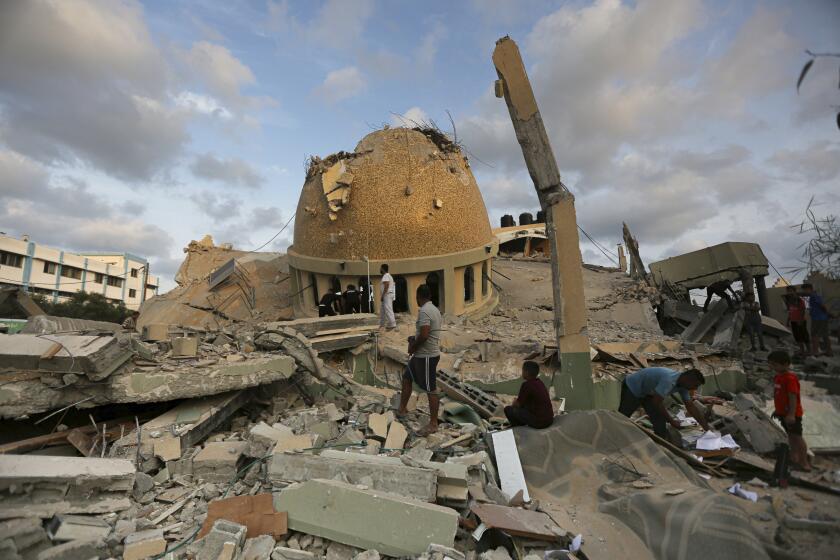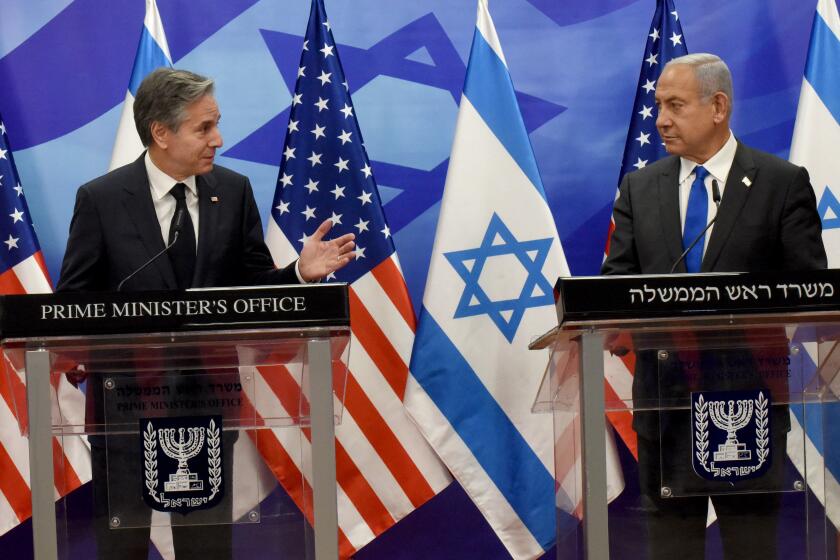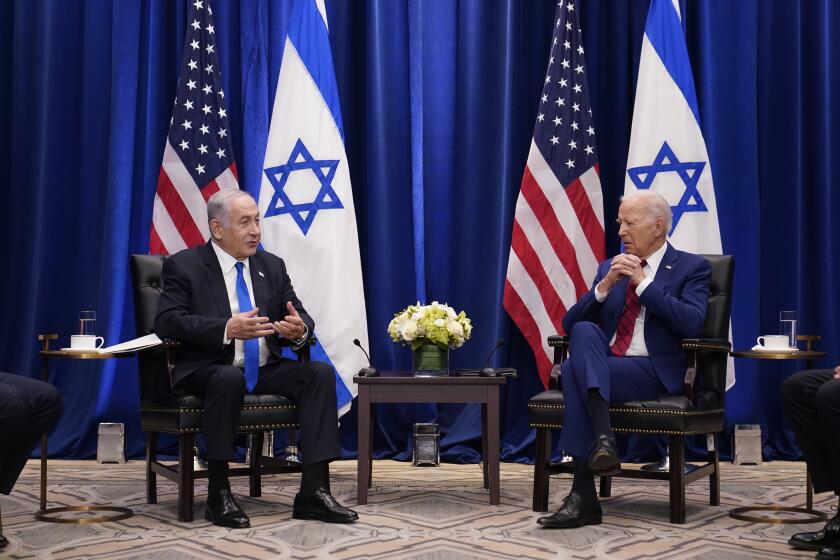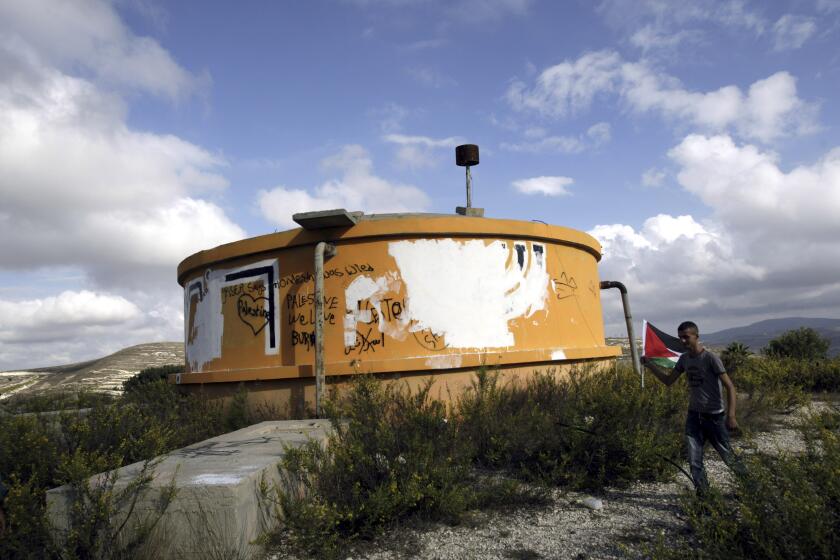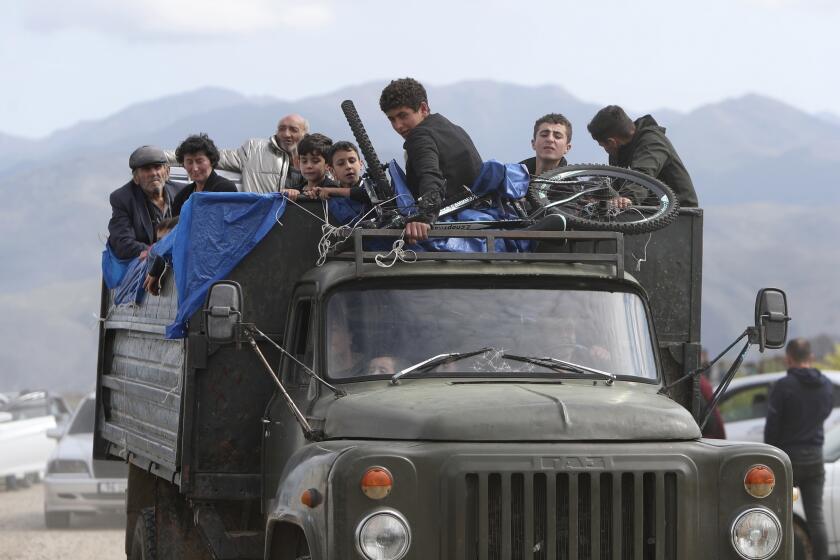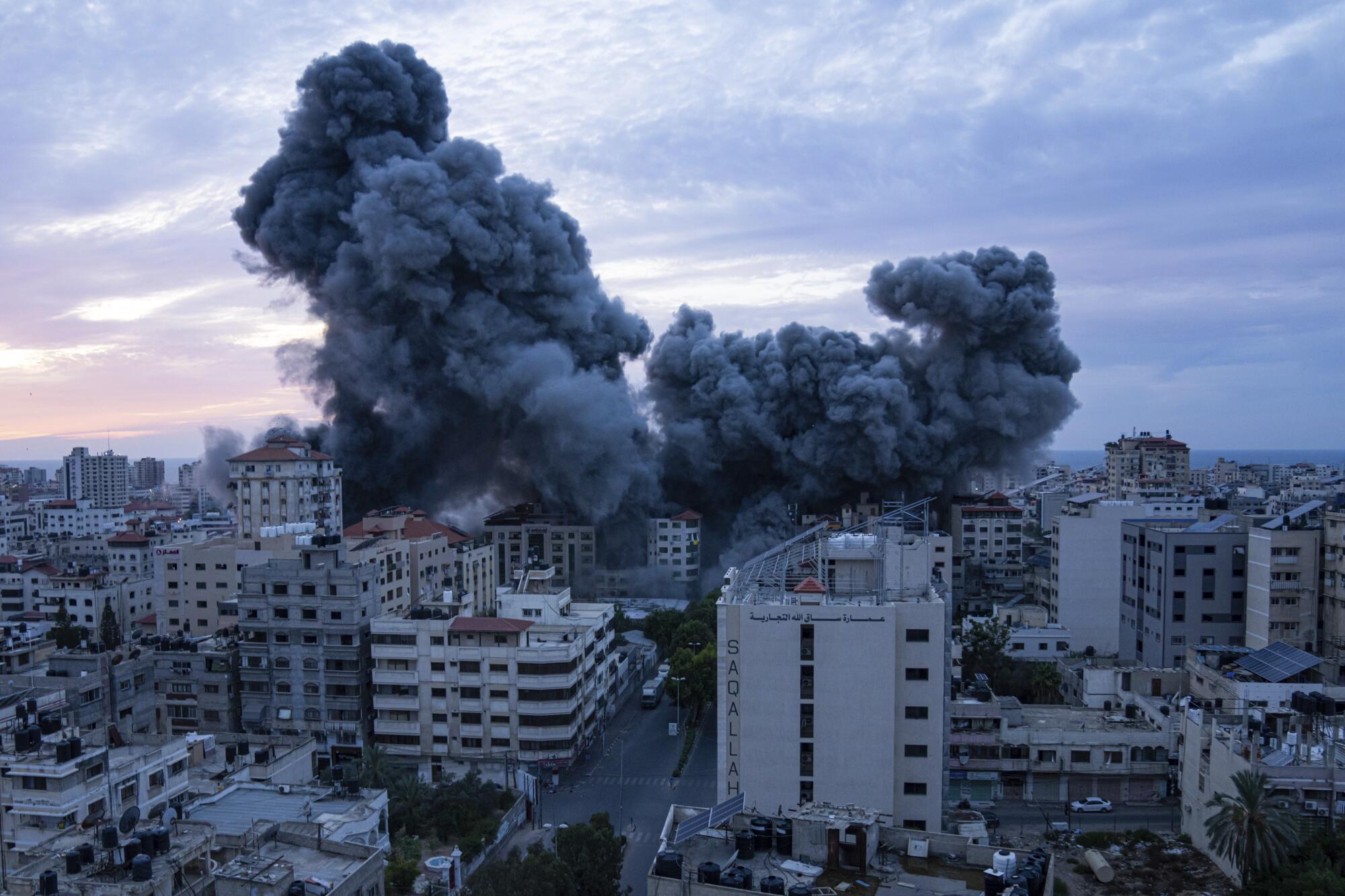
- Share via
JERUSALEM — Backed by a barrage of rockets, dozens of Hamas militants broke out of the blockaded Gaza Strip and into nearby Israeli towns, leaving at least 250 Israelis dead and others held hostage in an unprecedented surprise early morning attack during a major Jewish holiday Saturday.
A stunned Israel launched airstrikes in Gaza, with Israeli Prime Minister Benjamin Netanyahu saying his country is now “at war” with Hamas and vowing to inflict an “unprecedented price.”
In an assault of startling breadth, Hamas gunmen rolled into as many as 22 locations outside the Gaza Strip, including towns and other communities as far as 15 miles from the Gaza border.
In some places, they roamed for hours, gunning down civilians and soldiers as Israel’s military scrambled to muster a response. Gun battles continued well after nightfall, and militants held hostages in standoffs in two towns. Militants occupied a police station in a third town, where Israeli forces struggled until Sunday morning to finally reclaim the building.
Before daybreak Sunday, militants fired more rockets from Gaza, hitting a hospital in the Israeli coastal town of Ashkelon. The hospital sustained damage, said senior hospital official Tal Bergman. Video provided by Barzilai Medical Center showed a large hole punched into a wall and chunks of debris scattered on the ground of what appeared to an empty room and a hallway. There was no report of casualties.
A possibly protracted — and broadened — Middle East conflict looms as Israel and Hamas militants trade fire, leaving hundreds dead on both sides.
Israeli media, citing rescue service officials, said at least 250 people were killed and 1,500 wounded, making it the deadliest attack in Israeli territory in decades. At least 232 people in the Gaza Strip have been killed and at least 1,700 wounded in Israeli strikes, the Palestinian health ministry said. Hamas fighters took an unknown number of civilians and soldiers captive into Gaza, a deeply sensitive issue for Israel.
The conflict threatened to escalate to an even deadlier stage with Israel’s vows of greater retaliation. Previous conflicts between Israel and Gaza’s Hamas rulers brought widespread death and destruction in Gaza and days of rocket fire on Israeli towns. The situation is potentially more volatile now, with Israel’s far-right government stung by the security breach and with Palestinians in despair over a never-ending occupation in the West Bank and a suffocating blockade of Gaza.
In a televised address Saturday night, Netanyahu said the military will use all of its strength to destroy Hamas’ capabilities and “take revenge for this black day.” But he warned, “This war will take time. It will be difficult.”
“All the places that Hamas hides in, operates in, we will turn them into ruins,” he added. “Get out of there now,” he told Gaza residents, who have no way to leave the tiny, overcrowded Mediterranean territory of 2.3 million people.
The sudden war in Israel and Gaza upends political calculations as violence hits a scale not seen in decades.
Early Sunday, the Israeli military issued warnings in Arabic to residents of communities near the border with Israel to leave their homes and move to areas deeper inside the tiny enclave. In previous Israel-Hamas fighting on Gaza soil, the Gaza communities near the border were hit particularly hard, both by artillery fire and at times by ground incursions.
Gaza’s residents have endured a border blockade, enforced to varying degrees by Israel and Egypt, since Hamas militants seized control in 2007. Civilians are trapped and particularly vulnerable during wars and bouts of fighting.
Israeli airstrikes in Gaza intensified after nightfall, flattening several residential buildings in giant explosions, including a 14-story tower that held dozens of apartments as well as Hamas offices in central Gaza City. Israeli forces fired a warning just before.
Around 3 a.m., a loudspeaker atop a mosque in Gaza City blared a stark warning to residents of nearby apartment buildings: Evacuate immediately. Just minutes later, an Israeli airstrike reduced one nearby five-story building to ashes.
After one Israeli strike, a Hamas rocket barrage into central Israel hit four cities, including Tel Aviv and a nearby suburb, where two people were seriously injured. Throughout the day, Hamas fired more than 3,500 rockets, the Israeli military said.
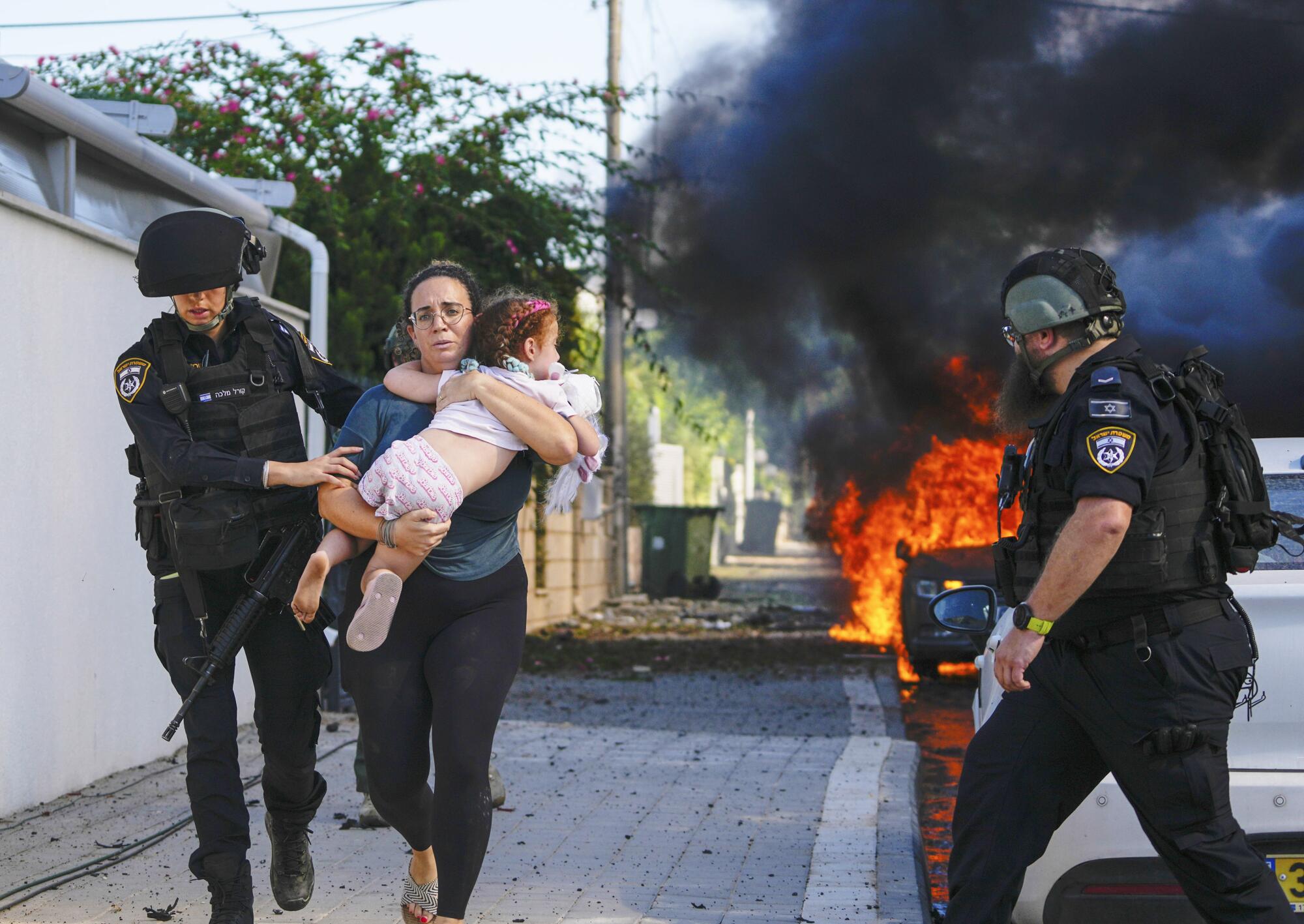
Much of Gaza’s population was thrown into darkness after nightfall as electricity from Israel — which supplies almost all the territory’s power — was cut off. Netanyahu’s office said in a statement that Israel would stop providing electricity, fuel and goods to Gaza.

The strength, sophistication and timing of the attack shocked Israelis. Hamas fighters used explosives to break through the border fence enclosing the long-blockaded Mediterranean territory, then crossed with motorcycles, pickup trucks, paragliders and speedboats on the coast.
In some towns, civilians’ bodies lay where they had encountered advancing gunmen. At least nine people gunned down at a bus shelter in the town of Sderot were laid out on stretchers on the street, their bags still on the curb nearby. One woman, screaming, embraced the body of a family member sprawled under a sheet next to a toppled motorcycle.
In amateur video, hundreds of terrified young people who had been dancing at a rave fled for their lives after Hamas militants entered the area and began firing at them. Israeli media said dozens of people were killed.
Among the dead in Israel was Col. Jonathan Steinberg, a senior officer who commanded the military’s Nahal Brigade, a prominent infantry unit.
The assault threatened to spiral into a greater conflict, mirroring previous conflicts between Israel and the Hamas militants ruling Gaza that brought widespread death and destruction in Gaza and days of rocket fire on Israeli towns.
The abduction of Israeli civilians and soldiers raised a particularly thorny issue for Israel, which has a history of making heavily lopsided exchanges to bring captive Israelis home.
Hamas’ military wing claimed it was holding dozens of Israeli soldiers captive in “safe places” and tunnels in the Gaza Strip. The Israeli military confirmed that a number of Israelis were abducted but would not give a figure. If true, the claim could set the stage for complicated negotiations on a swap with Israel, which is holding thousands of Palestinians in its prisons.
Hamas’ multipronged attack at daybreak caught Israel off guard on a major holiday. Netanyahu ordered a call-up of reservists and promised that Hamas would “pay an unprecedented price,” saying Israel would “return fire of a magnitude that the enemy has not known.”
“We are at war,” Netanyahu said in his televised address. “Not an ‘operation,’ not a ‘round,’ but at war.”
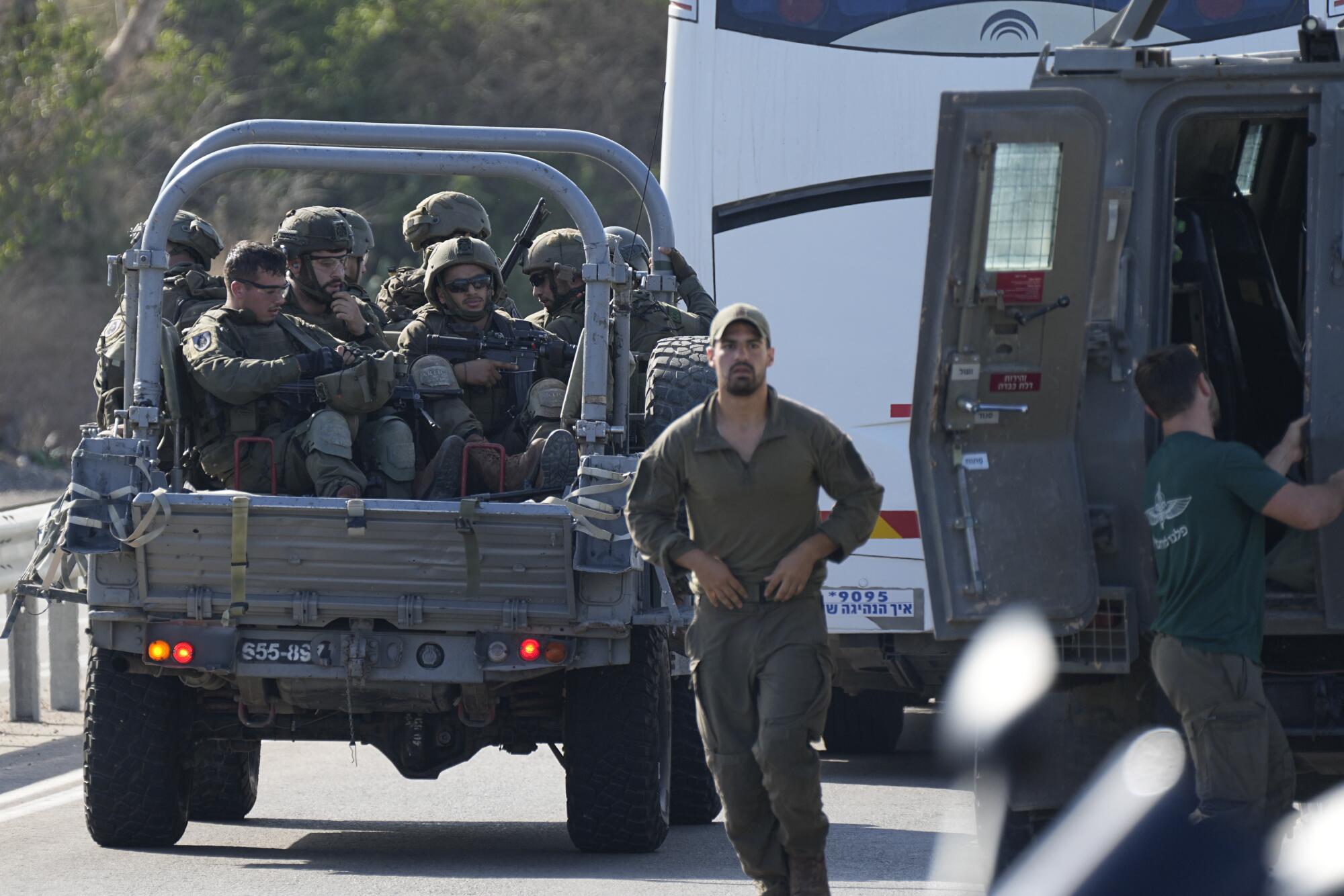
In Washington, President Biden condemned “this appalling assault against Israel by Hamas terrorists from Gaza.”
“Israel has the right to defend itself and its people — full stop,” Biden said in remarks at the White House on Saturday afternoon.
The president said he earlier spoke with Netanyahu and would personally remain in close contact with the Israeli leader. He called U.S. support of Israel “rock solid and unwavering.”
“This is not a moment for any party hostile to Israel to exploit these attacks to seek advantage,” Biden warned. “The world is watching.”
Biden was joined by Secretary of State Antony J. Blinken and other senior national security officials at the White House for emergency meetings on the crisis, the State Department said. Blinken was telephoning world leaders in an effort to decide on a course of action, a department spokesman said.
U.S. condemnation of the massive attack by Palestinian militants has been uniform and universal.
The Biden administration was alerted to the rocket attacks in Israel about 2:30 a.m. EDT and spent the early hours working with Israeli and regional counterparts to determine what was unfolding, according to a senior administration official who briefed reporters later.
It was unclear what type of aid the U.S. agreed to provide Israel, but the official emphasized that Defense Secretary Lloyd J. Austin III has been in contact with his Israeli counterpart and there has been coordination “up and down our military chains.”
Though there is bipartisan support for Israel, congressional dysfunction in Washington could postpone efforts to send more weapons or aid. Discussions on support are still in early stages, according to the senior administration official.
The House cannot conduct business until a new speaker is elected to replace the ousted Kevin McCarthy (R-Bakersfield). The Senate, which is on recess next week, is also due to decide on confirming Biden’s pick for ambassador to Israel, former Treasury Secretary Jack Lew, who was tapped for the role in September.
European governments, which are usually more sympathetic to Palestinians than U.S. administrations, were highly critical of the attack.
Saudi Arabia, which has been in talks with the U.S. about normalizing relations with Israel, released a statement calling on both sides to exercise restraint. The kingdom said it had repeatedly warned about “the dangers of the situation exploding as a result of the continued occupation [and] the Palestinian people being deprived of their legitimate rights.”
Several hours after the invasion across the heavily fortified Israel-Gaza border began, Hamas militants were still fighting gun battles inside several Israeli communities in a surprising show of strength that shook the country.
At a meeting of top security officials later Saturday, Netanyahu said the first priority was to “cleanse the area” of enemy infiltrators, then to “exact a huge price from the enemy” and to fortify other areas so that no other militant groups join the war.
The U.S. is so far empty-handed in dealing with Israel’s radical government and dysfunctional Palestinian leadership.
The serious invasion on the Jewish holiday of Shemini Atzeret revived painful memories of the 1973 war in which Israel’s enemies launched a surprise attack on Yom Kippur, the holiest day of the Jewish calendar.
Comparisons to one of the most traumatic moments in Israeli history sharpened criticism of Netanyahu and his far-right allies, who had campaigned on more aggressive action against threats from Gaza. Political commentators lambasted the government over its failure to anticipate what appeared to be a Hamas attack unseen in its level of planning and coordination.
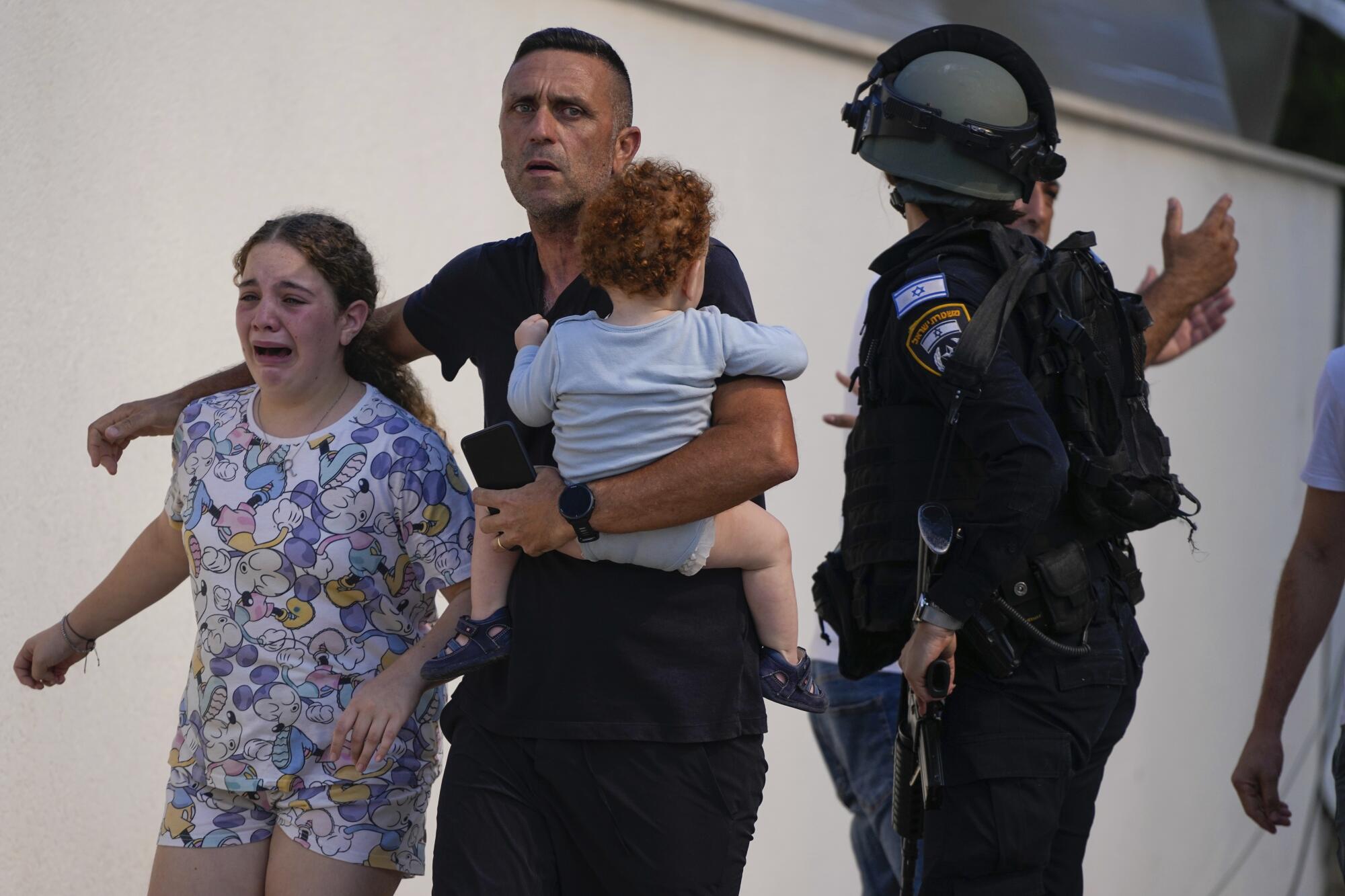
The Israeli military struck targets in Gaza in response to some 3,500 rockets that sent air-raid sirens wailing constantly as far north as Tel Aviv and Jerusalem, about 50 miles away. It said its forces were engaged in gunfights with Hamas militants who crossed the separation fence and invaded Israel through the air with paragliders, the army said.
Israeli TV broadcast footage of explosions tearing through the Gaza-Israel fence, followed by what appeared to be Palestinian gunmen riding into Israel on motorcycles. Gunmen also reportedly entered on pickup trucks.
The Hamas attack came after weeks of simmering tensions along the Gaza frontier. Over the last year, Israel’s far-right government has ramped up settlement construction in the occupied West Bank, Israeli settler violence has displaced hundreds of Palestinians there, and tensions have flared around a Jerusalem holy site.
The meeting did not take place at the White House as Netanyahu would have preferred, but in a New York hotel on the margins of the annual United Nations General Assembly, which both leaders were attending this week.
Hamas said it had planned for a potentially long fight. “We are prepared for all options, including all-out war,” the deputy head of the Hamas political bureau, Saleh al-Arouri, told Al Jazeera TV. “We are ready to do whatever is necessary for the dignity and freedom of our people.”
The shadowy leader of Hamas’ military wing, Mohammed Deif, announced the start of what he called “Operation Al Aqsa Storm.” The Al Aqsa Mosque compound in Jerusalem is the third-holiest site in Islam, and is on the holiest site for Jews, who refer to it as the Temple Mount.
“Enough is enough,” Deif, who does not appear in public, said in the recorded message, as he called on Palestinians from East Jerusalem to northern Israel to join the fight. “Today the people are regaining their revolution.”
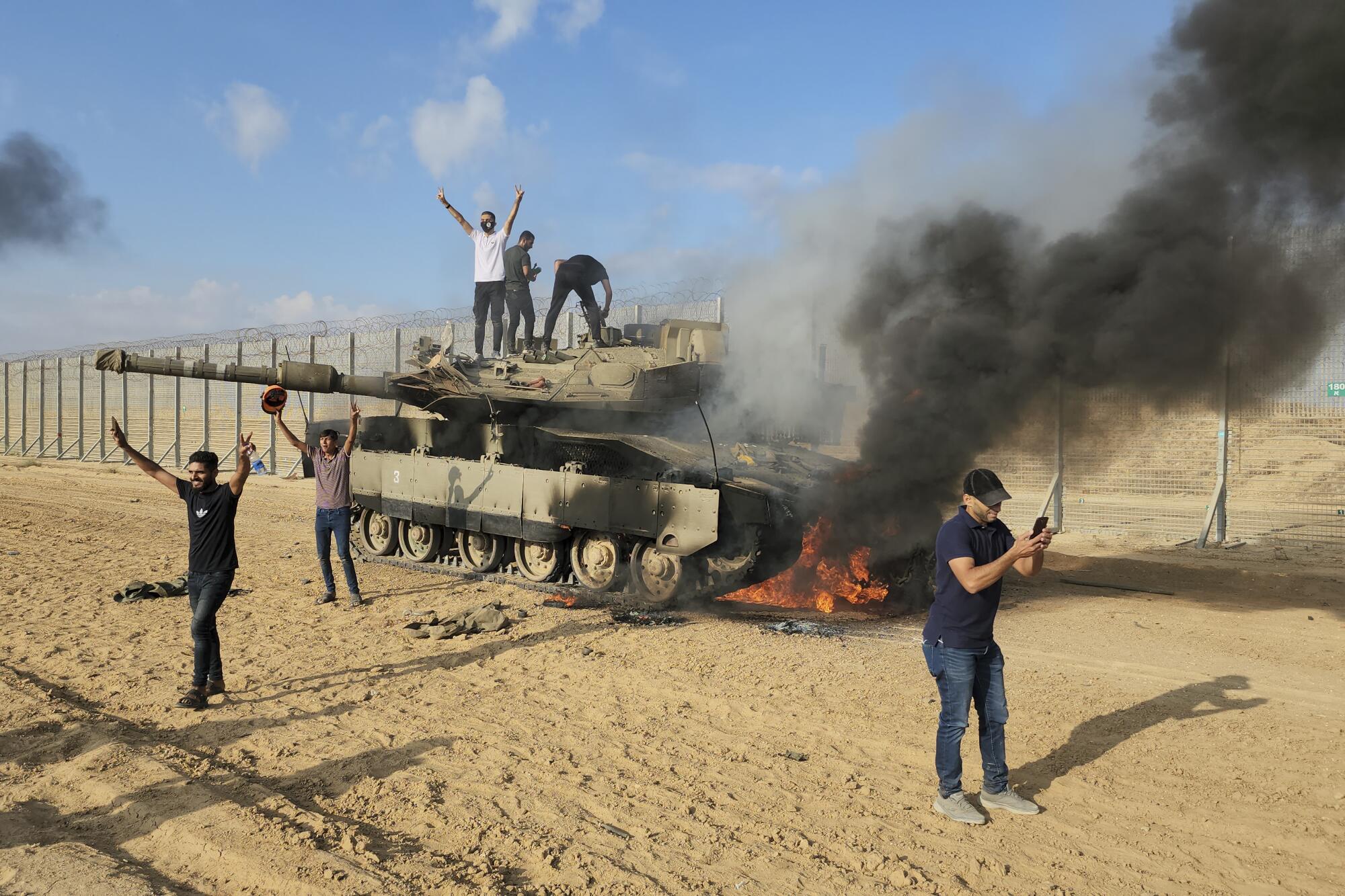
Israeli lawmakers have repealed a 2005 act that saw four Jewish settlements in the occupied West Bank dismantled when it withdrew from the Gaza Strip.
The attack comes at a time of historic division within Israel over Netanyahu’s proposal to overhaul the judiciary. Mass protests over the plan have sent hundreds of thousands of Israeli demonstrators into the streets and prompted hundreds of military reservists to avoid volunteer duty — turmoil that has raised fears over the military’s battlefield readiness and raised concerns about its deterrence of its enemies.
The infiltration of fighters into southern Israel marked a major accomplishment — and escalation — by Hamas. Millions of people were hunkering down in safe rooms, sheltering from rocket explosions and ongoing gun battles with Hamas fighters. Cities and towns emptied as the military closed roads near Gaza. The army ordered residents near the Palestinian enclave to stay inside. Israel’s rescue service appealed to the public to donate blood.
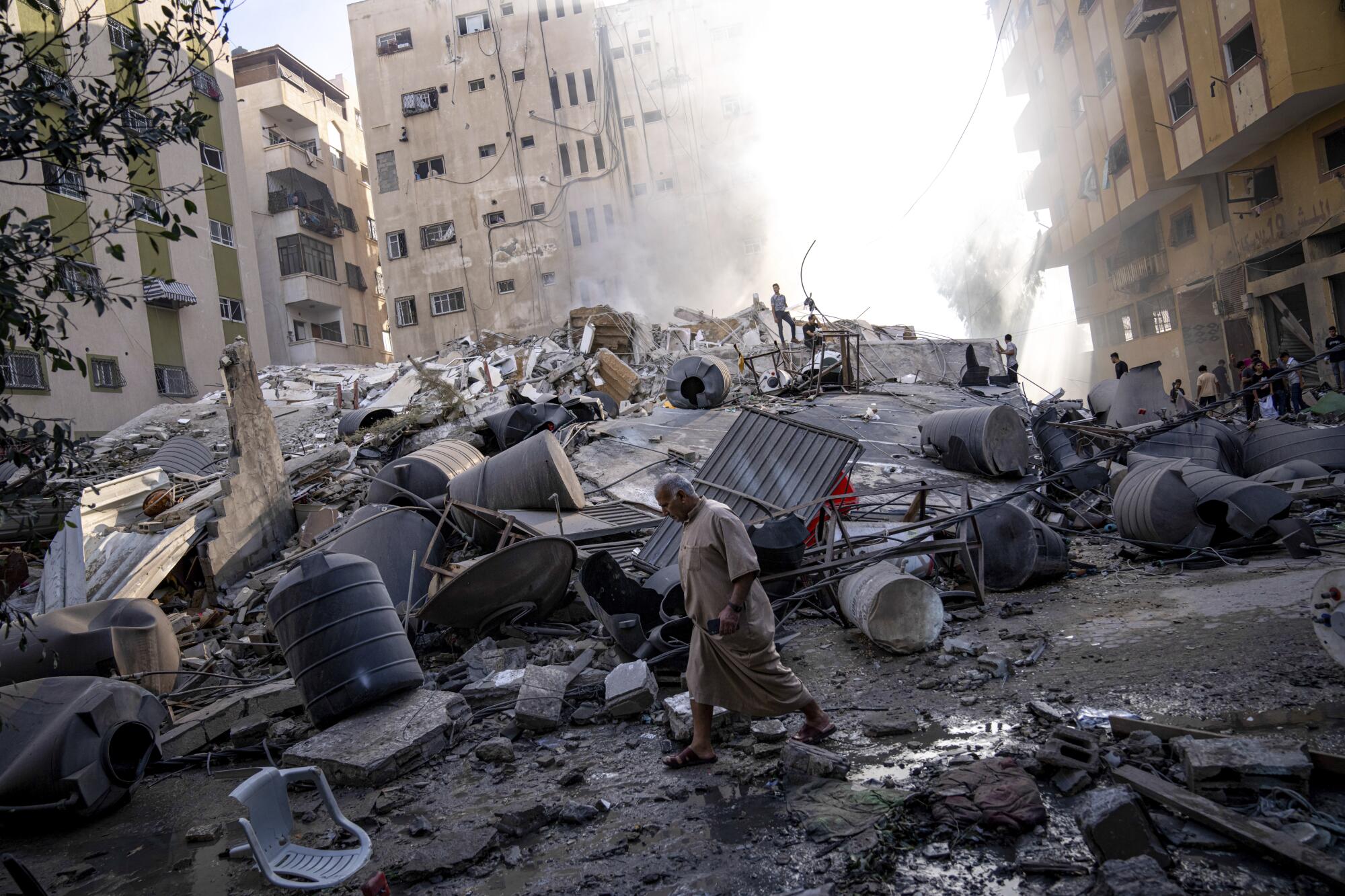
“We understand that this is something big,” said Lt. Col. Richard Hecht, an Israeli army spokesperson. He said the Israeli military had called up the army reserves.
Hecht declined to comment on how Hamas had managed to catch the army off guard. “That’s a good question,” he said.
Breaking News
Get breaking news, investigations, analysis and more signature journalism from the Los Angeles Times in your inbox.
You may occasionally receive promotional content from the Los Angeles Times.
Ismail Haniyeh, the exiled leader of Hamas, said that Palestinian fighters were “engaged in these historic moments in a heroic operation” to defend the Al Aqsa Mosque in Jerusalem and the thousands of Palestinian prisoners held by Israel.
In the kibbutz of Nahal Oz, just 2½ miles from the Gaza Strip, terrified residents who were huddled indoors said they could hear constant gunfire echoing off the buildings as fighting continued even hours after the initial attack.
“With rockets we somehow feel safer, knowing that we have the Iron Dome [missile-defense system] and our safe rooms. But knowing that terrorists are walking around communities is a different kind of fear,” said Mirjam Reijnen, a 42-year-old volunteer firefighter and mother of three in Nahal Oz.
Israel has built a massive fence along the Gaza border meant to prevent infiltrations. It goes deep underground and is equipped with cameras, high-tech sensors and sensitive listening technology.
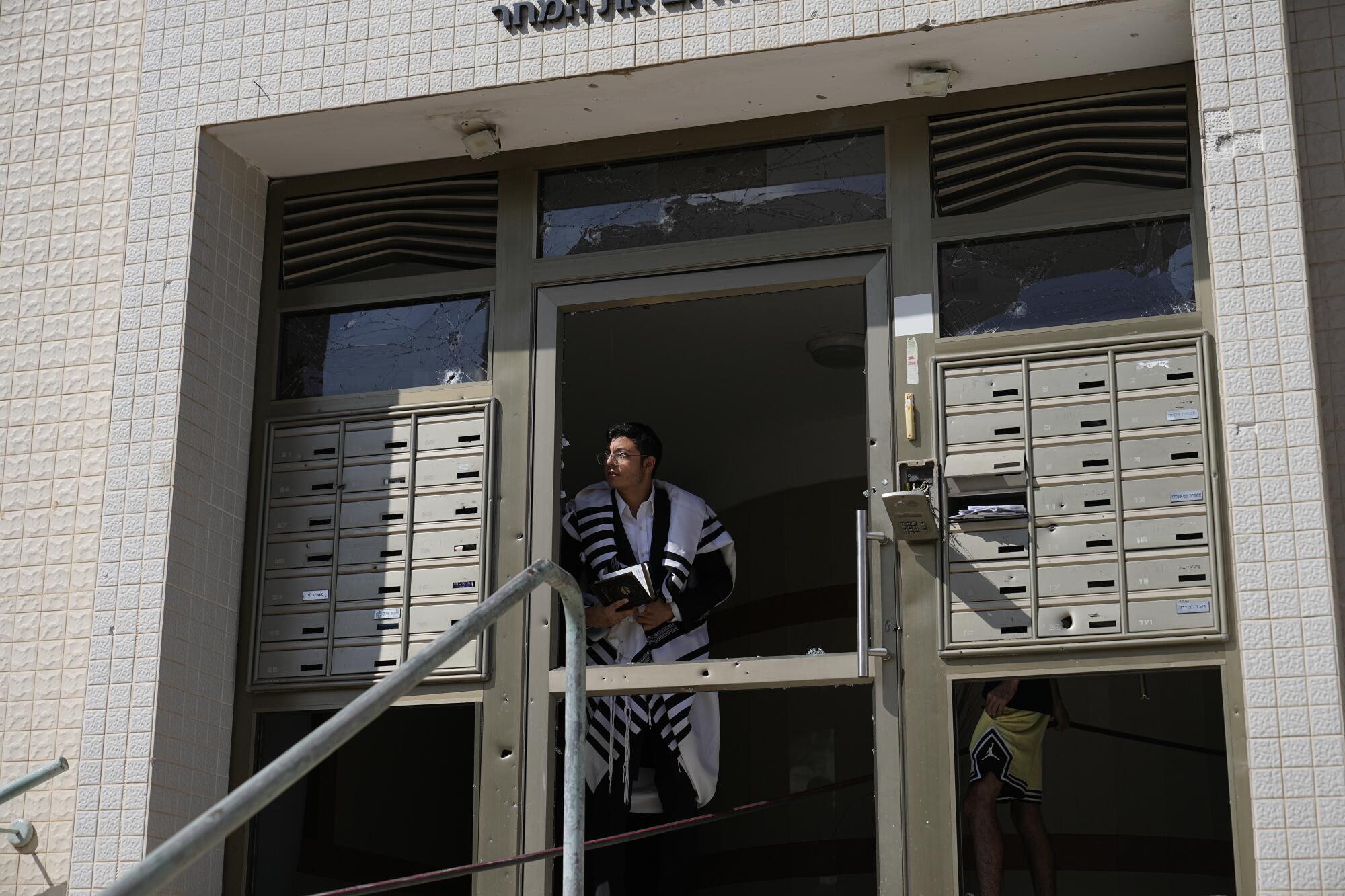
But the divisions within Israel’s army ranks have threatened to undermine Netanyahu’s reputation as a security expert who would do anything to protect Israel and the cohesion of an institution crucial to the stability of a country locked in low-intensity conflicts on multiple fronts and facing threats from Lebanon’s Hezbollah militant group.
Hezbollah congratulated Hamas, praising the attack as a response to “Israeli crimes” and saying the militants had “divine backing.” The group said its command in Lebanon was in contact with Hamas.
Israel has maintained a blockade of Gaza since Hamas seized control of the territory in 2007. The bitter enemies have fought four wars since then. There have also been numerous rounds of less intense fighting between Israel and Hamas and other, smaller militant groups based in Gaza.
Israel has quietly helped fuel Azerbaijan’s campaign to recapture Nagorno-Karabakh, supplying powerful weapons to the country.
The blockade, which restricts the movement of people and goods in and out of Gaza, has devastated the territory’s economy. Israel says the blockade is needed to keep militant groups from building up their arsenals. The Palestinians say the closure amounts to collective punishment.
The escalation in hostilities comes during a period of heavy fighting in the West Bank, where nearly 200 Palestinians have been killed in Israeli military raids this year. In the volatile northern West Bank, scores of militants and residents poured into the streets in celebration at the news of the rocket barrages.
Israel says the raids are aimed at militants, but people uninvolved in the violence have also been killed.
Times staff writers Tracy Wilkinson and Courtney Subramanian in Washington contributed to this report.
More to Read
Sign up for Essential California
The most important California stories and recommendations in your inbox every morning.
You may occasionally receive promotional content from the Los Angeles Times.
